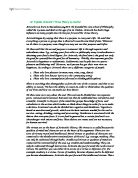Critically Asses Virtue Theory & Explain the concept of a miracle
Critically Asses Virtue Theory (15 marks)
The virtue theory derives from Aristotle who thought that we as human beings should ask the question ‘How should I live?’ rather than the dominant question at the foundation of deontological ethical theories, ‘What should I do?’ Aristotle maintained that the ultimate ‘telos’ (ultimate purpose) for human beings is to develop the characteristics of a virtuous person. These virtues have to be cultivated and the main goal is to require the ‘Golden mean’. This is the virtue that lies in-between the vice of deficiency and the vice of excess. For example for the virtue of ‘courage’ there could be a deficiency of ‘cowardice’ and an excess of ‘rashness’. When we have met all the needs of this theory we are essentially a ‘good’ person, we can cope with moral dilemmas without a set of rules, by using our own virtuous judgements to determine our actions. There are many strengths attached to the virtue theory, the main appeal is that it steers away from the deontological theory which has absolute moral rules which can cause extreme problems. It helps us have a sense of our own innate morals and use our own judgments on a situation which avoids the problem of having conflict between personal feelings and what the theory tells us to do. Another advantage is that it can be accommodated by both religious and secular ethics. Jesus can be seen as the ultimate virtuous person for whom we should aspire to, or the inspiration can come from peers. It does not set unrealistic goals and is pretty simple in essence. The theory claims to be universal however one problem with this is that virtues may differ through different cultures, this is known as cultural relativism and asks how we can provide universal answers to who we ought to be when different cultures value different traits. Another problem with the theory is how to distinguish which virtues are most valuable and therefore the virtues which must be cultivated, someone who is considered as a virtuous role model for one person, may not be desirable for another. Aristotle’s ‘means’ are not as easy to apply to all traits as courage which has clear deficiency and excess, therefore making the golden mean hard to identify. Overall the theory does come with problems however does go some way to providing a theory for ethical decision making. One thing it excels in is not condoning any outrageously immoral acts which most deontological theories fail to do.







